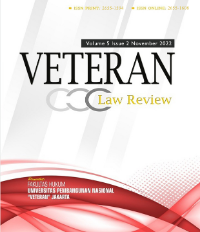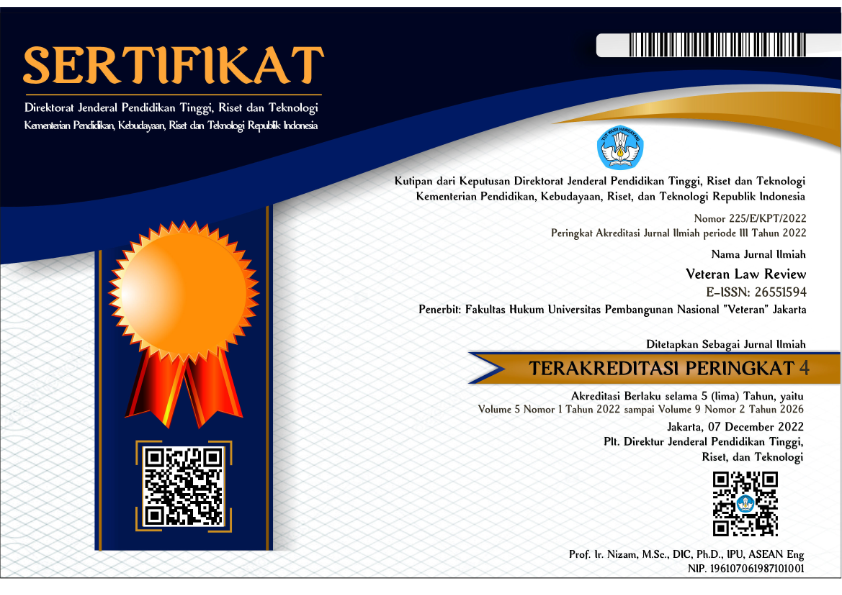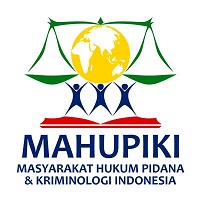Reconception of Local Working Patent as a Form of Legal Progressivity in the Era of Disruption
DOI:
https://doi.org/10.35586/velrev.v5i2.4624Keywords:
The Progressivity of Law, Intellectual Property Rights, Local Working Patent, Technology TransferAbstract
Technological knowledge in the era of disruption has an important role in responding to the complex needs of society. In order to fulfill the needs, humans continue to produce new discoveries that need legal recognition and protection for the results of human intellectual abilities. One of the manifestations of intellectual wealth is in the form of patents. The main goal to be achieved is to encourage the creation, inventions and intellectual works of Indonesian citizens which in turn are able to create national independence. As an effort to control technology through patent rights, a Local Working Patent concept was formed which is regulated in Article 20 of Act Number 13 of 2016 on Patents. The Local Working Patent mandated in this article is in the form of a provision whereby when a patent has been granted by the state, the patent inventor is obliged to apply the patent in Indonesia to support technology transfer, investment and employment absorption. However, Act Number 11 of 2020 on Ciptaker eliminates this concept because this obligation is considered burdensome and can reduce investment from abroad. In this case the law should follow and oversee the needs and interests of the society. This means that the law must be progressive and must not be left behind by changes in society so that it can accommodate new existing interests. Based on this postulate, the writer wants to contribute in the form of a paper that comprehensively discusses the problems that exist in patent protection. The research method used is normative juridical research with a statutory approach and a conceptual approach. Thus, the author offers an idea in the form of a reconception of Local Working Patent which is ideal to be applied in Indonesia by meeting and fulfill the national and outsiders interests.
Downloads
References
Books:
Djumhana. M dan Djubaedillah, (2014), Hak Kekayaan Intelektual, Sejarah Teori dan Identitasnya di Indonesia, Percetakan ke-4, Bandung: Citra Aditya Bakti.
Fanny. R, (2016), Reformasi Regulasi Paten di Indonesia, Semarang : Makalah Seminar.
Hidayah. K, (2017), UU HKI tentang Hak Kekayaan Intelektual, Malang: Setara Press.
Ibrahim. J, (2007), Teori dan Metodologi Penelitian Hukum Normatif, Malang : Penerbit Bayumedia.
Idris. K, (2000), Kekayaan Intelektual sebuah Kekuatan untuk Pertumbuhan Ekonomi, Jakarta : Direktorat Jenderal Hak Kekayaan Intelektual, Departemen Kehakiman dan Hak Asasi Manusia Republik Indonesia
Irawan. C, (2011), Politik Hukum Hak Kekayaan Intelektual Indonesia; kritik terhadap WTO/TRIPs Agreement dan Upaya membangun Hukum Kekayaan Intelektual Demi Kepentingan Nasional, Bandung : Mandar Maju.
Kansil. C.S.T, (1990), Paten Hak Kekayaan Intelektual, Merek Perusahaan, Merek Bisnis, Hak Cipta, Jakarta : Percetakan Pertama, Bumi Aksara Tim Lindsey, (et al), (2003), Hak Kekayaan Intelektual sebuah Pengantar, Bandung: Alumni.
Kesowo. B, (1995), Pengenalan Umum Hak Kekayaan Intelektual (HAKI) di Indonesia, Yogyakarta: Fakultas Hukum Gadjah Mada.
Mahmodin. M.M, (et al), (2011), Satjipto Rahardjo dan Hukum Progresif-Urgensi dan Kritik, Jakarta : Epistema Institutue dan HuMa.
Mamudji. S, et al., (2005), Metode Penelitian dan Penelitian Hukum, Depok: Badan Penerbit Fakultas Hukum Universitas Indonesia.
Martosoewignjo. S.S, (1987), Persepsi Tata Cara dan Sistem Perubahan Konstitusional dalam Batang Tubuh UUD 1945, Bandung: Penerbit Alumni.
Mochtar. D.A, (2001), Perjanjian Lisensi Pengalihan Teknologi dalam Pengembangan Teknologi Indonesia, Bandung : Penerbit Alumni.
Nurbaningsih. E, (2015), Naskah Akademik RUU Paten, Jakarta: Badan Pengembangan Hukum Nasional.
Nazir. M, (2005), "Metode Penelitian", Jakarta : Ghaila Indonesia.
Rahardjo. S, (2007), Biarkan Hukum Mengalir (Catatan Kritis tentang Perjuangan Manusia dan Hukum), Jakarta: Penerbit Buku Kompas.
Rahmawati. N.R, (2006), Hukum Ekonomi Internasional, Malang: Bayumedia
Rooseno. N dan Heraty, (1978), Masalah Paten dalam Praktik, Bandung : Bina Cipta.
Saidin. OK, (2013), Aspek Hukum Hak Kekayaan Intelektual, Jakarta: Raja Grafindo Persada.
Samuelson, P.A. and Nordhaus, W.D. (1998), Economics, Singapore: The McGraw-Hill Companies Inc.
Soekanto. S dan Mamuji. S, (2007), Penelitian Hukum Normatif Gambaran Singkat
------------------------------------, (2001), Meneliti Hukum Normatif, Jakarta : Rajawali Press.
Sukisno B, (2008), Karakter Penelitian Hukum Normatif dan Sosiologis, Yogyakarta: PUSKUMBANGSI LEPPA UGM, Jakarta : Sinar Raja Grafindo Persada.
Gautama. S dan Winata. R, (1997), Conventions on New Intellectual Property Rights for Indonesia, Bandung: PT Citra Aditya Bakti.
Van Apeldoorn, (2001), Pengantar Hukum, Jakarta : Pradnya Paramita.
Journals:
Heller, Michael A, "The Tragedy Of The Anticommons: Property in The Transition From Marx to Markets", Harvard Law Review, Vol 111, No 3, (1998): 622-687.
Nasution. A.D.I.A, Supriyatno, Mansar. A, “Juridical Study of The Implementation of The Principles of Equality of The Parents Partes In Construction Action Contract Which Is Made In A Notary Face”, Veteran Law Review, Vol 4, No 2, (2021): 130-143.
Nuryadi. D, "Teori Hukum Progresif dan Penerapannya di Indonesia", Jurnal Ilmiah Hukum De’Jure: Kajian Ilmiah Hukum, Vol 1, No 2, (2016): 395-408.
O.K. Saidin, "Transplantasi Hukum Asing ke dalam Undang-Undang Hak Cipta Indonesia: Kemenangan Ideologi Kapitalisme pada Ideologi Pancasila", Journal of Intellectual Property Rights, Vol 20, No 4, (2015): 231-249.
Rahardjo. S, "Hukum Progresif: Hukum Yang Membebaskan", Jurnal Hukum Progresif, Program Doktor Hukum Univ. Diponegoro, Vol 1, No 1, (2005): 1-24.
Pakpahan. N.H, “Solving Manpower Act’s Legal Redundancy Through Job Creation Act’s Foreign Manpower Utilization Plan”, Veteran Law Review, Vol 4, No 2, (2021): 109-119.
Sitorus. W, “Kepentingan Publik dalam Perlindungan Paten”, Yuridika Journal, Vol 29, No 1, (2014): 39-59.
Sulistiawati. R, "Pengaruh Investasi terhadap Pertumbuhan Ekonomi dan Lapangan Kerja serta Kesejahteraan Masyarakat di Provinsi-Provinsi di Indonesia", Jurnal Ekonomi Bisnis dan Kewirausahaan, Vol 3, No 1, (2017): 29-50.
Laws and Regulations:
Academic Manuscript of Law Number 11 of 2020 concerning Ciptaker
Agreement on Trade Related Aspects of Intellectual Property Rights
Law Number 11 of 2020 concerning LN Ciptaker: 245, TLN, 6573
Law Number 13 of 2016 concerning LN Patents: 176, TLN: 5922
Law Number 25 of 2007 concerning Investment, LN No. 67, TLN No. 4724
Manuscript of the Academic Manuscript of Law Number 11 of 2020 concerning Cipta Kerja
Website Material:
Agus Sardjono, "Local Working Patent", Indonesia For Global Justice, 5/10/2020, https://igj.or.id/local-working-patent/ Badan Koordinasi Penanaman Modal, "Melebihi Target, Realisasi Investasi 2019 Capai 800 Triliun", Kementerian Investasi/BKPM, 1/2020, https://www.bkpm.go.id/id/publikasi/siaran-pers/readmore/2377101/45201
DJ Wardynsnski, "Technology and Society : How Technology Changed Our Lives", Brainspire, 24/10/2022, https://www.brainspire.com/blog/technology-and-society-how-technology-changed-our-lives
Selvie Sinaga, "Ancaman Paten terhadap Perjalanan Kesehatan Masyarakat dan Pengamanan", Universitas Katolik Indonesia Atma Jaya, 20/12/2015 ,https://m.atmajaya.ac.id/web/KontenUnit.aspx?gid=artikel-hki&ou=hki&cid=ancaman-paten-terhadap-kesehatan-publik-dan-safeguards-trips
Downloads
Published
How to Cite
Issue
Section
License
Copyright (c) 2022 Veteran Law Review Journal
Veteran Law Review © 2022 by Faculty of Law Universitas Pembangunan Nasional "Veteran" Jakarta is licensed under Creative Commons Attribution 4.0 International

1. License
The non-commercial use of the article will be governed by the Creative Commons Attribution license as currently displayed on Creative Commons Attribution 4.0 International.
2. Author(s)' Warranties
The author warrants that the article is original, written by the stated author(s), has not been published before, contains no unlawful statements, does not infringe the rights of others, is subject to copyright that is vested exclusively in the author, and free of any third party rights, and that any necessary written permissions to quote from other sources have been obtained by the author(s).
3. User/Public Rights
VELREV's spirit is to disseminate articles published are as free as possible. Under the Creative Commons Attribution-ShareAlike 4.0 International License. VELREV permits users to copy, distribute, display, and perform the work for non-commercial purposes only. Users will also need to attribute authors and VELREV to distributing works in the journal and other media of publications.
4. Rights of Authors
Authors retain all their rights to the published works, such as (but not limited to) the following rights;
- Reproduce the work
- Prepare derivative works based upon the work
- Distribute copies of the work
- Perform the work publicly
- Display the work publicly
- Copyright and other proprietary rights relating to the article, such as patent rights,
- The right to self-archive the article,
- The right to enter into separate, additional contractual arrangements for the non-exclusive distribution of the article's published version (e.g., post it to an institutional repository or publish it in a book), with an acknowledgement of its initial publication in this journal (Veteran Law Review).
5. Co-Authorship
If the article was jointly prepared by more than one author, any author submitting the manuscript warrants that he/she has been authorized by all co-authors to be agreed on this copyright and license notice (agreement) on their behalf, and agrees to inform his/her co-authors of the terms of this policy. VELREV will not be held liable for anything that may arise due to the author's internal dispute. VELREV will only communicate with the corresponding author.
6. Royalties
Being an open accessed journal and disseminating articles for free under the Creative Commons license term mentioned, author(s) are aware that VELREV entitles the author(s) to no royalties or other fees.
7. Miscellaneous
VELREV will publish the article (or have it published) in the journal if the article’s editorial process is successfully completed. JOSI's editors may modify the article to a style of punctuation, spelling, capitalization, referencing, and usage that deems appropriate. The author acknowledges that the article may be published so that it will be publicly accessible and such access will be free of charge for the readers as mentioned in point 3.


















